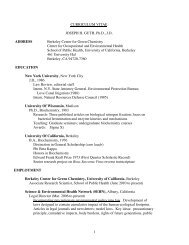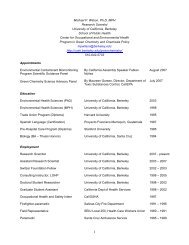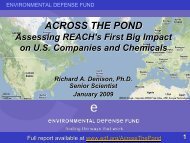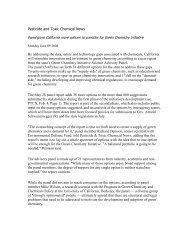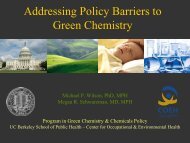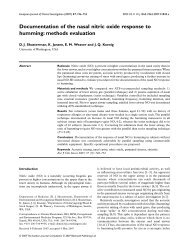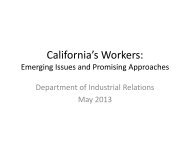Berkeley Center for Green Chemistry - Center for Occupational and ...
Berkeley Center for Green Chemistry - Center for Occupational and ...
Berkeley Center for Green Chemistry - Center for Occupational and ...
Create successful ePaper yourself
Turn your PDF publications into a flip-book with our unique Google optimized e-Paper software.
<strong>Berkeley</strong> <strong>Center</strong> <strong>for</strong> <strong>Green</strong> <strong>Chemistry</strong>:<br />
A Novel Interdisciplinary Approach to Chemical Sustainability<br />
Michael P. Wilson, PhD, MPH<br />
Megan R. Schwarzman, MD, MPH<br />
Dean Richard Mathies, PhD, College of <strong>Chemistry</strong><br />
Dean Stephen Shortell, PhD, MPH, School of Public Health<br />
University of Cali<strong>for</strong>nia, <strong>Berkeley</strong><br />
Funding: <strong>Berkeley</strong> <strong>Center</strong> <strong>for</strong> Public Environmental Health Tracking (CDC)<br />
<strong>Berkeley</strong> Institute of the Environment
<strong>Berkeley</strong> <strong>Center</strong> <strong>for</strong> <strong>Green</strong> <strong>Chemistry</strong><br />
Faculty:<br />
College of <strong>Chemistry</strong><br />
College of Engineering<br />
New<br />
Chemistries<br />
Health &<br />
Environment<br />
Faculty:<br />
School of Public Health<br />
College of Natural Resources<br />
Policy<br />
& Economy<br />
Faculty:<br />
<strong>Center</strong> <strong>for</strong> Law, Energy <strong>and</strong> Environment<br />
Haas School of Business<br />
Education, Research, Engagement
European Union Affecting Global Change<br />
Cosmetics Directive (2004)<br />
WEEE: Waste in Electrical <strong>and</strong> Electronic Equipment (2005)<br />
RoHS: Restriction on Hazardous Substances (2006)<br />
REACH: Registration, Evaluation, Authorization, <strong>and</strong> Restriction of<br />
Chemicals (2007)
Global Chemical Production<br />
- Growing 3% per year<br />
- Doubling every 25 years<br />
- Four-fold growth by 2050, indexed to 2000<br />
OECD 2001, ACC 2003, UN 2004
<strong>Green</strong> <strong>Chemistry</strong> Initiative<br />
Cali<strong>for</strong>nia EPA’s Policy Recommendations<br />
1. Exp<strong>and</strong> Pollution Prevention<br />
2. Develop <strong>Green</strong> <strong>Chemistry</strong> Capacity<br />
3. Create an Online Product Ingredient Network<br />
4. Create an Online Toxics Clearinghouse (SB 509)<br />
5. Accelerate the Quest <strong>for</strong> Safer Products (AB 1879)<br />
6. Move Toward a Cradle-to-Cradle Economy
Policy with Environmental & Economic Aims<br />
Per Capita Electricity Consumption, 1960-2007<br />
Source: Cali<strong>for</strong>nia Energy Commission, 2007
New<br />
Chemistries<br />
Lead Unit - College of <strong>Chemistry</strong><br />
Education<br />
• Insure that the principles <strong>and</strong> practices of green chemistry are<br />
second nature to the next generation of chemists <strong>and</strong> chemical<br />
engineers<br />
• Redesign <strong>and</strong> rebuild undergraduate teaching labs to incorporate<br />
principles of green chemistry<br />
Innovation<br />
• Design new chemistries to address the challenges of limited<br />
natural resources, environmental toxicity, <strong>and</strong> climate change<br />
• Develop sustainable processes <strong>for</strong> energy production, chemical<br />
manufacture, bioremediation <strong>and</strong> CO 2 fixation
New Chemistries:<br />
Faculty & Researchers (selected)<br />
Lisa Alvarez-Cohen, PhD (Civil-Env Engineering): Bioremediation of environ. contaminants<br />
John Arnold, PhD (Chem): <strong>Green</strong> oxidation processes<br />
Bob Bergman, PhD (Chem): Efficient, non-halogenated catalyst development<br />
Michelle Chang, (Chem): Biosynthesis of pharmaceuticals <strong>and</strong> biofuels<br />
Douglas Clark, PhD (ChemE): Biocatalysis, cell culture “Data Chip”<br />
David Dornfeld, PhD (Mech Engineering): Sustainable manufacturing
Health &<br />
Environment<br />
Lead Unit - School of Public Health<br />
In<strong>for</strong>m the design of safer substances<br />
• Identify highest-priority substances <strong>and</strong> toxicity pathways that dem<strong>and</strong><br />
the new solutions offered by green chemistry<br />
• Develop new toxicity testing methods <strong>for</strong> chemical screening<br />
Create safe jobs <strong>and</strong> healthy communities<br />
• Improve underst<strong>and</strong>ing of the relationship between exposure <strong>and</strong> disease<br />
• Develop new prevention <strong>and</strong> remediation strategies<br />
• Ensure that “clean technologies” are safe <strong>for</strong> workers <strong>and</strong> reduce<br />
environmental contamination
Health & Environment:<br />
Faculty & Researchers (selected)<br />
John Harte, PhD (Energy Resources Group): Global change ecology<br />
Dale Johnson, PhD, PharmD (Natural Resources): Predictive toxicology<br />
Rachel Morello-Frosh, PhD (Natural Resources): Toxicant exposure, environmental justice<br />
Steve Rappaport, PhD (Public Health): Exposure biology<br />
Megan Schwarzman, MD, MPH (Public Health): Health <strong>and</strong> ecosystem effects<br />
Chris Vulpe, MD, MPH (Natural Resources): Ecotoxicology, genomics
Policy & Economy<br />
Public Policy Context:<br />
• European laws: REACH<br />
• Cali<strong>for</strong>nia laws: AB 1879<br />
Lead Unit – Haas School of Business<br />
Business context:<br />
• Need improved supply chain management<br />
• Need predictability/lead time<br />
• Challenge of sustainability<br />
Design business strategies<br />
• Improve the safety of chemical <strong>and</strong> product supply chains<br />
• Speed adoption of new technologies<br />
Develop decision-making tools<br />
• Address health <strong>and</strong> environmental risks of chemicals in light of scientific uncertainties<br />
In<strong>for</strong>m public policies<br />
• Improve in<strong>for</strong>mation transparency <strong>and</strong> accountability in the chemicals market<br />
• Increase viability of safer alternatives
Policy & Economy:<br />
Faculty & Researchers (selected)<br />
Eric Bieber, JD (Law): Natural resources law<br />
Alastair Iles, PhD (Natural Resources): Sustainable production<br />
Dara O’Rourke, PhD (Natural Resources): Global supply chains<br />
Christine Rosen, PhD (Business): Socially responsible business<br />
Michael Wilson, PhD, MPH (Public Health): Science <strong>and</strong> policy
<strong>Berkeley</strong> <strong>Center</strong> <strong>for</strong> <strong>Green</strong> <strong>Chemistry</strong>:<br />
Initial Projects<br />
http://bie.berkeley.edu/cgc/home<br />
Curriculum development<br />
• <strong>Green</strong> undergraduate chemistry lab modules <strong>and</strong> web lectures<br />
• Interdisciplinary doctoral program (IGERT-NSF) in <strong>Green</strong> <strong>Chemistry</strong><br />
• BCGC Graduate group <strong>for</strong>mation<br />
Seminars<br />
• Lectures <strong>and</strong> discussions on sustainable chemical design<br />
BCGC Roundtable<br />
• Convene faculty to develop collaborative projects<br />
New<br />
Chemistries<br />
Health &<br />
Environment<br />
International Collaborations<br />
• Europe, Africa, Asia<br />
Policy<br />
& Economy
<strong>Berkeley</strong> <strong>Center</strong> <strong>for</strong> <strong>Green</strong> <strong>Chemistry</strong>:<br />
Multidisciplinary Vision <strong>for</strong> the Future<br />
“It is essential that we initiate a generational change in our production <strong>and</strong> use<br />
of chemical products. The BCGC’s interdisciplinary approach can accomplish that<br />
by bringing together scholars in chemistry, the environmental health sciences,<br />
public policy, economics, <strong>and</strong> the law.<br />
Only in this way can we truly advance the necessary research <strong>and</strong> education in<br />
sustainable chemical practices.”<br />
-- Richard Mathies, PhD<br />
Dean, College of <strong>Chemistry</strong><br />
“The BCGC illustrates the breadth of Public Health. It has the power to address issues<br />
which affect all of us nearly every day of our lives.”<br />
-- Stephen Shortell, PhD, MPH<br />
Dean, School of Public Health



